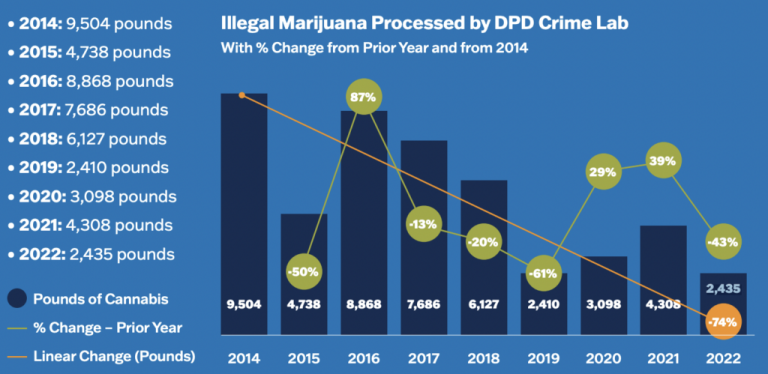As Colorado approaches its 10-year anniversary since legal adult-use marijuana sales began, the city of Denver has released a report indicating that its local regulatory framework has effectively reduced the size of the illicit market, with law enforcement processing a record low amount of illegal cannabis in 2022.
The municipal government’s report also provides an overview of marijuana licensing and sales trends, showing how the recreational market has gradually overtaken the medical cannabis industry and how overall sales have started to slump. It additionally details how tax revenue from marijuana purchases is being locally distributed and the limited progress of the city’s social equity program.
Denver, the first city in the U.S. where adult-use retailers opened up in 2014 following voter approval of a reform initiative at the ballot in 2012, is offering a case study supporting advocates’ arguments that implementing a legal and regulated cannabis market can curb illicit sales.
According to the report, police in the city processed 2,435 pounds of illegal marijuana in 2022—down 74 percent since the first retailers opened. It’s possible that in addition to being largely driven by a reduced demand for unregulated products, some of the decline in seizures is attributable to police de-prioritizing cannabis enforcement in the legal environment.

Via City of Denver.
“As legalization continues across the country, Denver serves as a resource for guidance on how to effectively implement and manage a regulatory framework for legal marijuana,” Mayor Michael Hancock (D) said in an introduction to the report.
“The city’s dedicated team of experts manages a complex and ever-changing regulatory and licensing process. This work includes legislation to create, improve, and clarify ordinances, management of education and health initiatives, social equity, coordination of enforcement efforts, and allocation of resources—all in concert with the industry and the community,” the outgoing mayor who leaves office later this month said. “I am proud of the foundation my Administration has built over the past decade and their dedicated efforts to ensure a bright future for this industry.”
The report also shows that cannabis sales fell for the first time in 2022, dropping 21 percent statewide and 28 percent locally compared to 2021.
As has been observed in other states that enact adult-use legalization, Colorado’s medical cannabis industry has also taken second seat to the recreational market. Eighty-seven percent of marijuana sales came from adult-use retailers last week, up from 45 percent in the first year of recreational sales in 2014.
Despite the overall decline in sales, Colorado took in $54,841,877 in cannabis tax revenue in 2022, the report shows. Most of that revenue is going toward initiatives targeting homelessness and housing affordability. Cannabis tax dollars are also being spent on education, prevention, regulation and enforcement.

Via City of Denver.
A social equity program that was implemented in 2021 to support efforts to promote industry participation by people who’ve been disproportionately impacted by criminalization appears to be struggling, the report also shows. Just 20 of the city’s 1,017 registered marijuana businesses are owned by social equity licensees. And white people account for 90 percent of cannabis business owners, compared to the 4.4 percent who are Black.
A spokesperson for the Denver Department of Excise and Licenses, which published the new report, pointed out in an email to Marijuana Moment that the analysis only covers up to January 1 of this year.
“As of today, there 32 social equity qualified applicants who have been approved for various marijuana licenses and 31 that are pending,” he said. “Denver has marijuana business licensing exclusivity for most marijuana licenses through July 2027. With 31 marijuana business licenses issued to social equity applicants, Denver has one of the most successful social equity programs in U.S. history.”
The mayor, for his part, said in the new report that the data shows “Denver is the gold standard for cannabis regulation and a worldwide leader.”
“Denver has brought unlicensed operators into compliance and created a collaborative model of marijuana management,” Hancock, who initially opposed marijuana legalization in Colorado, said. “We developed ordinances to regulate, license and tax medical and retail marijuana. Denver has embraced a management model that is quick, responsive, and nimble in collaboration with a fast-developing and innovative industry.”
The spokesperson told Marijuana Moment that “many cities and states have copied” Denver’s approach as they’ve crafted their own cannabis regulations.
“Mayor Hancock is obviously the longest serving government chief executive to oversee local marijuana regulations in U.S. history,” he said.
—
Marijuana Moment is tracking more than 1,000 cannabis, psychedelics and drug policy bills in state legislatures and Congress this year. Patreon supporters pledging at least $25/month get access to our interactive maps, charts and hearing calendar so they don’t miss any developments.
Learn more about our marijuana bill tracker and become a supporter on Patreon to get access.
—
Meanwhile, Denver is also positioned to lead on another national experiment: launching psilocybin “service centers” following Colorado voters’ approval of another reform measure last year that’s actively being implemented, with support from legislation that the governor signed into law in May.
Gov. Jared Polis (D) also said at a conference in Denver last month that he wants the legislature to give him authority to grant pardons for people with prior psychedelics convictions on their records.
Also in May, Polis signed a bill into law that will allow online marijuana sales.
He further approved legislation that will bolster marijuana-related protections for working professionals in the state—effectively codifying an executive order he issued last year.
State officials are also pushing Congress to further resolve the marijuana industry’s unique financial and public safety issues by passing the bipartisan Secure and Fair Enforcement (SAFE) Banking Act this session.
